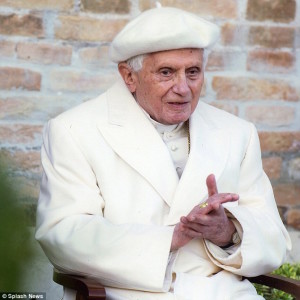A few weeks ago, Pope Emeritus Benedict XVI was interviewed by Fr. Jacques Servais, S.J. The interview, originally published in German, is available in English here. It is a remarkable document that can be read as Benedict defending the Catholic faith against certain current theological trends.
Early in the interview Benedict speaks of the nature of faith. “Faith is not the product of reflection nor is it an attempt to penetrate the depths of my own being. . . .In order for me to believe, I need witnesses who have met God and who have made him accessible to me.”
He continues:
The faith community does not create itself. It is not an assembly of men who have some ideas in common and who decide to work for the spread of those ideas. . . . A Church built in this way cannot be for me the guarantor of eternal life nor require decisions that make me suffer and are contrary to my desires.
The Church did not produce herself: “She was created by God and she is continually formed by Him. This finds expression in the sacraments and above all in baptism. I enter the Church not through a bureaucratic act but through the sacrament [of baptism].”
Sadly, Benedict finds, in some quarters, the notion that God is obliged to justify himself to mankind, given the horrible things in the world for which he is ultimately held to be responsible as Creator. Developing this view, some have even taken the heretical position that Christ did not suffer for the sins of man, but to cancel the guilt of God.
Addressing another distortion of the faith, Benedict identifies one that he takes to be a sign of the times, namely, the idea of the mercy of God as central to the Church’s dogmatic teaching. He finds this expressed in the notion that, “Only with mercy do evil and violence end. It is mercy that moves us toward God, while justice frightens us before Him.”
Although Benedict does not explicitly say so, one may find in this a version of a doctrine advanced by Luther and the Reformers, namely, “justification by faith in the mercy of God.”
About two-thirds of the way into the text, one gets to the heart of the document, when he declares that St. Anselm’s conception of the Church has unfortunately become incomprehensible to many of our contemporaries. From their limited perspective, “The fathers and the theologians of the Middle Ages were of the opinion that, essentially, the whole human race had become Catholic and that paganism existed now on the margins.”
But that perspective changed radically during the Age of Discovery: “In the second half of the last century, it was still affirmed that God cannot let go to perdition all the unbaptized and that even a purely natural happiness for them does not represent a real answer to the question of human existence.”
The great missionaries of the sixteenth century were convinced that those who are not baptized are forever lost, and consequently sought to bring Christianity to those who did not know it. Benedict observes, “After the Second Vatican Council this conviction was finally abandoned.”
And the consequence, of course, was a loss of a sense of urgency about the task of evangelization and missionary work: “Why should one try to convince the people to accept the Christian faith when they can be saved without it?”
In a key paragraph, Benedict draws the conclusion:
The obligatory nature of the faith and its way of life began [in the light of this new attitude] to seem uncertain and problematic. If there are those who can save themselves in other ways, it is not clear why the Christian himself is bound by the requirement of the Christian faith and its morals. If faith and salvation are no longer interdependent, faith itself becomes unmotivated.
He rejects two attempts to reconcile this attitude with the earlier tradition. One version declares that when a man accepts his “essential being,” he is a Christian without knowing it. The other suggests that all religions, each in their own way, lead man to God.
It is important for mankind that the truth of Christianity be recognized and practiced. “I think,” says Benedict, “that in this present situation it becomes clear what the Lord said to Abraham, that is, that ten righteous would have been sufficient to save the city, but that it destroys itself if such a small number is not reached.”
Can the ten good men be found? No doubt, all of us can name a few, but their influence is minimal within the ranks of the intellectual elite and the ruling classes of Europe and America. The unity that once created “Christendom” no longer exists. The secularism and atheism that now permeate the Old and New Worlds provide no moral content and militate against the pursuit of any common good.
Europe in particular is in a perilous state. Given Europe’s failure to maintain the culture that brought it into being and its consequent loss of identity, it is difficult to avoid the conclusion that it cannot be saved from self-destruction – apart from a resurgence of Christianity. And we in America are only a little behind them on that path.
















